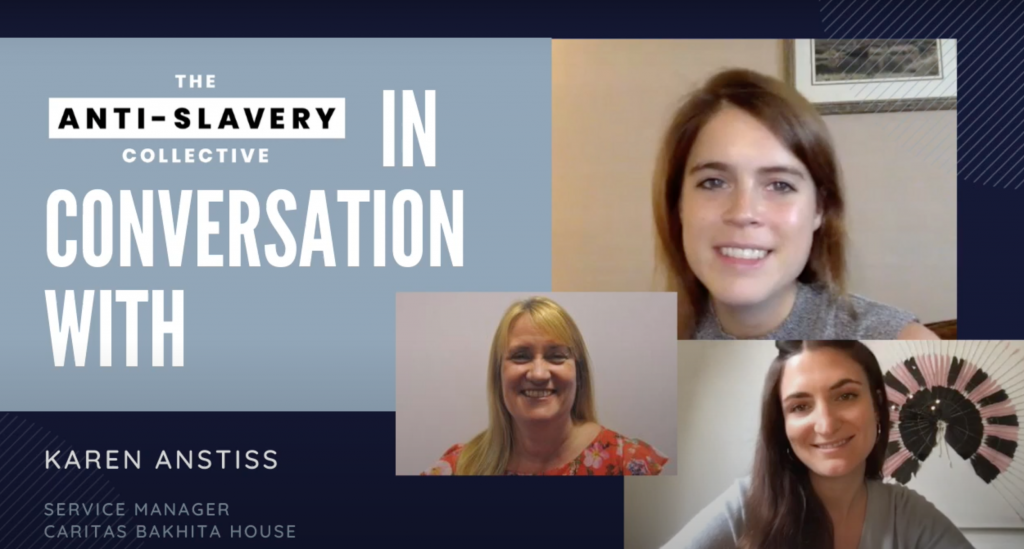Karen Anstiss is the Service Manager at Caritas Bakhita House, a safe house for women who have escaped modern slavery. Bakhita House is owned by the Diocese of Westminster and managed by Caritas Westminster.
Karen recently took part in a recorded video conversation with the co-founders The Anti-Slavery Collective, HRH Princess Eugenie of York and Julia de Boinville. In the video conversation, Karen discusses the specific challenges faced by survivors of modern slavery during the COVID-19 pandemic and describes how the staff and guests at Bakhita House have responded to the crisis.
In answer to a question from Princess Eugenie focusing on the current emotions of the guests in Bakhita House, Karen explained how the team has designed a new weekly routine of activities to support guests during the COVID-19 pandemic.
'We’ve reformed a Monday to Friday and a weekend to give the women a routine. From Monday to Friday between 10am and 8pm we have activities going on and we eat together at six. We meet for exercise on a Saturday afternoon and we do pampering evenings. And then on a Sunday, weather permitting, it’s lunch in the garden or a barbecue at two. And then we dance or play board games. We meet at seven every Sunday night to plan the week’s meals.’
‘We felt by having a routine and putting in place activities, we could sometimes divert their minds from their trafficking experiences and COVID. We do English, Sewing, Baking, Gardening. We’ve had Drama Therapy and Music Therapy put on Skype online so they can still access that. We have an English volunteer still doing English lessons online.’
Karen also explained why there is no set duration of time to determine how long any one guest will live at the house.
'We have had women that have come for six weeks because they’ve decided they wanted to go home, so we’ve made sure that passage home is safe, that there’s charities at the other end that can look after them. And we’ve had some women who, unfortunately, their asylum cases have become rather difficult and they’ve stayed for 14 months.'
'We've had 122 women from 39 countries aged between 15 and 70. The range is so massive that you do have to treat everybody as their own person with their own needs.'
Princess Eugenie offered a word of thanks to Karen for the work she is doing at Caritas Bakhita House to support the guests. 'The girls there are so happy and you foster such a wonderful environment. Thank you Karen. It’s amazing.'
Karen responded by pointing out that the success of the project is down to the hard work of the entire team at Caritas Bakhita House.
'It’s not me, it’s my team. They’re amazing. And my volunteers are exceptional. It takes so much to make this work. It couldn’t possibly be one person. It is just everybody around us. And the women themselves. But it has to have to right staff and the right volunteers to make it work. People go, "we just need to put a roof over your head", I don’t think that’s true. I think it’s what’s under the roof that counts.’
In response to a question about the challenges facing the guests at Bakhita House during the COVID-19 pandemic, Karen highlighted some of the unique difficulties experienced by the women she works with.
'The women that we are looking after have come from isolation. They’ve come from exploitation. This is meant to be their new beginning and we’re back in isolation. So, to them, this is very difficult mentally. They understand why we’ve got to isolate, but to them, isolation is actually a trigger. It's almost like a further punishment which is why we’re trying to do stuff with them all day, to take their mind of COVID and trafficking, to just focus somewhere else for a few hours every day to try and help that trauma level to stay as low as we possibly can.'
Karen also explains how, 'Everything that is affecting everybody in the country is affecting our women as well.' In addition to the trigger of isolation, the guests at Bakhita House have also come up against the same difficulties experienced by many others during lockdown, including long queues on the phone to set up benefits and the temporary closures of places of worship.
You can read more about the interview on The Anti-Slavery Collective website here.
You can support the work of Caritas Bakhita House here.
Further information and contact details for Bakhita House are available here.




